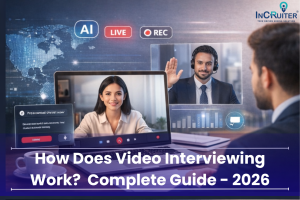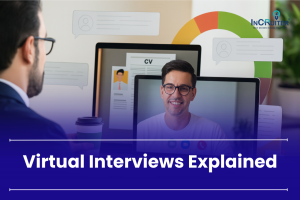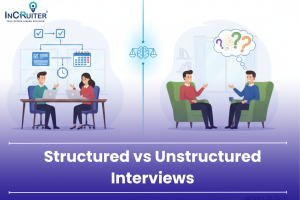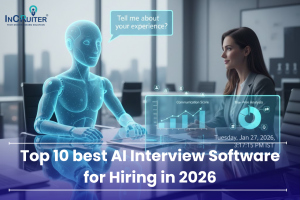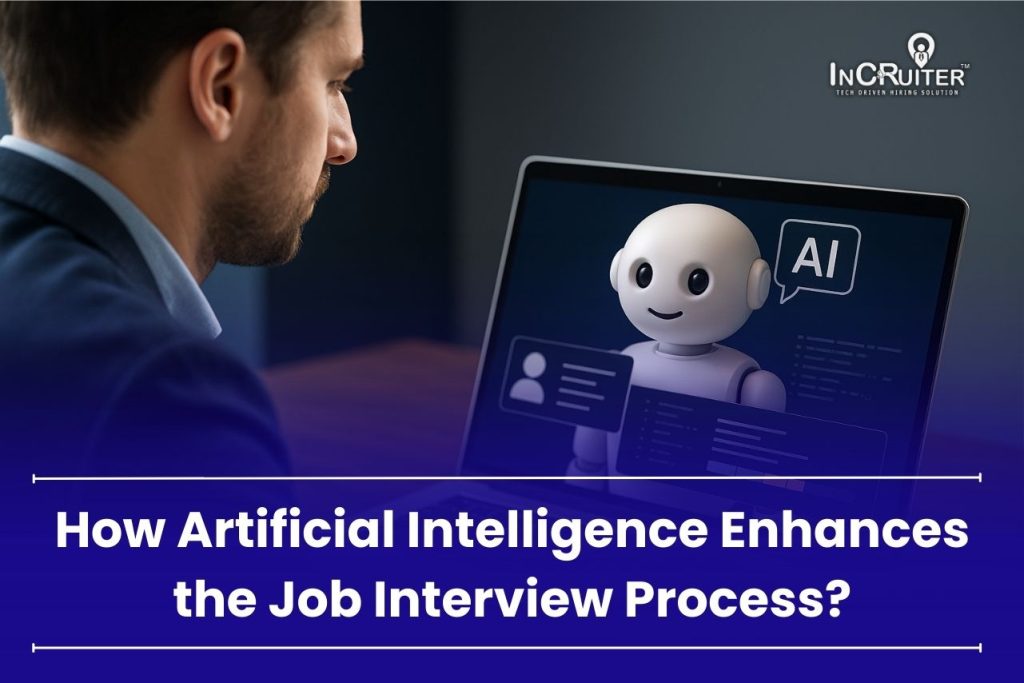
Hiring today is not just about filling a position; it’s about making decisions faster, smarter, and with greater confidence. Traditional interviews often struggle with bias, interview scheduling delays, and inconsistent evaluations. That is why top companies use AI bot for interviews, not to replace humans, but to elevate the process. From analyzing responses in real time to maintaining structure across roles, AI interviews are changing how companies assess talent.
In this blog, we examine the key benefits of utilizing AI-powered interviews in contemporary hiring.
What are AI interviews?
An AI interview bot is a high-tech, asynchronous interview solution built with artificial intelligence to automate the pre-screening interview process. In an AI-based interview setup, the candidate responds to pre-set AI-generated interview questions. Based on the candidate’s answer, conversational AI video Interview asks dynamic follow-up questions that give an in-depth view of the candidate’s capabilities.
Types of AI-based Interview Platforms
1. One-Way Interview
In this format, the AI bot displays a set of static interview questions one by one on the screen. The candidate records responses without any real-time interaction. Since there’s no conversation, it feels isolated, as they answer alone,
2. Two-Way Interview
In this format, conversational AI interacts with the candidate in real-time. After each response, it instantly analyzes the answer and asks dynamic follow-up questions. This creates a two-sided conversation, making the interview feel more natural, engaging, and adaptive.
3. AI Chatbot Interviews
Before allowing job applications, the AI chatbot conducts an eligibility check by asking key screening questions. Only candidates who meet the required criteria can proceed, ensuring that only qualified and relevant profiles enter the recruitment pipeline.
4. AI Video Interview Assistant
The Interview by AI assistant supports both the candidate and the interviewer. It guides candidates through the interface and instructions while helping interviewers with question prompts, skill-based suggestions, proxy interview alerts, and feedback submission, ensuring a smooth, efficient, and secure interview experience for both sides.
5. AI-driven Coding Assessment
Candidates solve real-time coding tasks tailored to the job role. The AI video Interview auto-evaluates code quality, logic flow, runtime efficiency, and edge case handling. It detects plagiarism, provides skill-wise scoring, and accurately ranks candidates, eliminating the need for manual reviews in technical hiring.
6. Gamified AI Video Interviews
Gamified Interview by AI, tasks include puzzles, memory games, logic challenges, and time-based decision-making scenarios. AI tracks problem-solving speed, accuracy, and adaptability. It measures soft skills such as attention, persistence, and critical thinking, making assessments engaging while revealing genuine behavioral strengths.
7. AI Phone Screening
In this fully automated phone interview by AI calls candidates and asks job-specific questions using natural voice prompts. AI assesses tone, fluency, response time, and content accuracy. The system flags hesitation, off-topic replies, and low confidence, instantly filtering out unfit candidates.
How AI Interview Software Works?
Today’s interviews don’t always start with a handshake. In today’s fast-evolving hiring world, especially inside top MNCs and large enterprises, a quieter revolution is underway. Big firms like Google, Microsoft, and Apple are now starting to use AI for interviews, replacing traditional interview formats.
These innovative technologies respond, adapt, and learn, much like modern browser-integrated AI systems that assist users in real time. This makes the AI in hiring process more dynamic, more structured, and surprisingly more human than before.
Step 1: Define the Role Parameters
Start by entering the job title, selecting the functional domain (tech or non-tech), and defining the experience requirements. Intelligent AI video Interview system suggests core and secondary skills. Once finalized, attach a job description and indicate open positions to build a structured foundation for assessments.
Step 2: Structure the Interview Flow
Design the interview format by choosing between Conversational AI for interviews or static one-way video interview styles. Select question types: general, domain-specific, coding, or aptitude, and define scoring logic. Add candidate-facing instructions to guide them through the process, ensuring clarity and consistency across varied interview journeys.
Step 3: Automated Interview Invites
After mapping candidates to positions and question sets, the system auto-generates interview links. Whether sent in bulk or individually, AI interviewing removes the need for back-and-forth coordination and ensures timely, structured candidate engagement.
Role of Artificial Intelligence in the Job Interview Process
1. Shifting AI from Tool to AI Interviewer
AI no longer plays a backstage role. It actively drives any kind of pre-screening interview, asking questions, adapting in real-time, and responding intelligently, taking over what human interviewers traditionally managed in structured assessments.
2. Enabling Scalable Pre-Screening
AI enables companies to pre-screen thousands of candidates without compromising assessment quality. Each candidate undergoes a tailored interview question tailored to the job position, ensuring relevance without increasing the recruiter’s workload.
3. Making Interviews Dynamic
Unlike traditional back-and-forth interview formats, AI interviewing evolves with each response. If a candidate gives a surface-level answer, Conversational AI for interviews, especially for pre-screening, can probe deeper, mirroring the nuance of honest human-like conversations, but without human presence.
4. Structured Data-Driven Hiring
AI interviewing turns every answer into measurable insights, scoring logic, clarity, behavior, and skill fit. This removes subjective bias and enables data-driven hiring decisions rather than relying on guesswork or human interviewer intuition.
5. Detailed Feedback Reporting
AI does more than ask questions. It guides candidates through the process, flags suspicious proxy interview activity, and generates detailed AI-backed feedback reports offering feedback to both sides in ways no manual process can match.
6. Equalizing the Candidate’s Experience
The AI interview bot ensures that every candidate, regardless of location or background, receives the same level of structure, challenge, and opportunity, making the process fairer and more inclusive by design.
Advantages of AI-Based Interviews in the Modern Hiring Process
1. Reduces Interviewer Burnout
By handling repetitive and high-volume digital interviews with AI relieves in-house interviewers are relieved from constant back-to-back virtual interview sessions, preserving focus for final-stage or Level-2 evaluations and improving overall team efficiency.
2. Interview Flexibilities for Candidates
Candidates can attend interviews at their convenience within a defined time window. This flexibility for AI in interviews improves completion rates, reduces drop-offs, and accommodates working professionals or those in different time zones without compromising the structure or quality of AI assessments.
3. Captures Missed Signals Humans Overlook
The technology, such as AI for interviews, tracks micro-responses, hesitations, pauses, keyword gaps, or inconsistencies that human interviewers often miss. AI in hiring process leads to deeper insights, particularly in roles that involve behavioral or communication aspects, such as managerial, team lead, or salesperson roles.
4. Provides Consistent Interview Quality
No matter where a candidate applies from, AI ensures the tone, flow, and difficulty level of interviews remain consistent, which is critical for companies hiring across multiple regions or markets.
5. Enables 24/7 Virtual Interviewing
AI in hiring process runs 24/7. Candidates in different time zones can complete interviews on their own schedule, helping companies attract talent globally without requiring live availability.
6. Minimizes Time Lost on Misaligned Profiles
Instead of discovering mismatches during late-stage interview calls, AI for interviews filters them out in the early recruitment stage by matching the JD to the CV. This AI assessment reduces wasted time spent on shortlisting off-fit candidates.
7. ATS Integration Capabilities
AI interview platforms often integrate seamlessly with various Applicant Tracking Systems, enabling automatic syncing of applicant profiles, status updates, and evaluation imports, thereby streamlining the hiring workflow without requiring recruiters to switch between disconnected interview tools.
8. Cheat-Proof AI Proctored Interviews
AI-powered proctoring monitors browser activity, face detection, audio feeds, and unusual behavior in real time. AI assessment flags identity mismatches and suspicious patterns, ensuring interview authenticity without needing manual invigilation.
For Candidates: How to Prepare for an AI-Based Job Interview
1. Understand the AI Interview Format
Some companies don’t use real people in the first round. Instead, they use tools like InCruiter AI interview chats robots to assess candidates through coding tests, video analysis, role-based questions, or gamified tests. These AI assessment tools try to understand how good you are by watching your face, hearing your voice, or testing your thinking speed. Before your interview, check what tools the company uses. Knowing this will help you get ready in the right way.
2. Practice AI-Friendly Communication
An Artificial Intelligence with an interview system is not just listening to what you say. It also checks how you say it. Try to answer in a clear way using a method called STAR talk about the situation, what you had to do, what you did, and what happened next. Don’t speak too fast or too slow. Avoid using too many filler words like “um” or “you know.” Look at the camera when you speak. It shows you’re sure and focused.
3. Optimize Your Resume for AI Screening
Typically, before a hiring team reviews your resume, an Applicant Tracking System (ATS) first scans it. To pass this stage, use keywords from the job description in your resume. Use a plain format, no photos, tables, or fancy designs. Keep it clean. Write your wins in numbers when you can, like “Helped grow sales by 30%.” Use bullet points to make your details easier to pick out.
4. Prepare for AI-Driven Assessments
Some jobs will ask you to do a few tasks before they talk to you. These could be code challenges, cognitive games, or common interview questions about how you act. If you’re applying for a tech job role, try coding problems ahead of time. For other roles, you may be asked about how you work in a team or handle stress. Be honest but also smart about your answers.
5. Test Your Tech Setup
AI interview software system will check more than your answers. It will also assess how you sound and how your video appears. Use a good mic and camera. Make sure you’re sitting in a quiet place with no mess behind you. Bright light is better than a dark room. Do a short test before the real interview to make sure everything works well. A noisy background or blurry video can reduce your score.
6. Research the Company’s AI Use
Every company works in a different way. Some ask you to chat with a conversational AI bot. Others check how you solve coding challenges in a tough situation. You can learn about their interview process from their website or job posts. Try to answer in a way that fits how the AI interview system works. AI in hiring process can help you pass the first stage and move ahead.
7. Stay Calm and Adaptable
AI interviews can feel impersonal, but staying composed is key. Treat chatbots like human recruiters; be professional and concise. If you advance, prepare for human follow-ups. Confidence and adaptability help you navigate both AI and traditional interview stages successfully.
Best AI Software for Job Interviews: A Closer Look
InCruiter
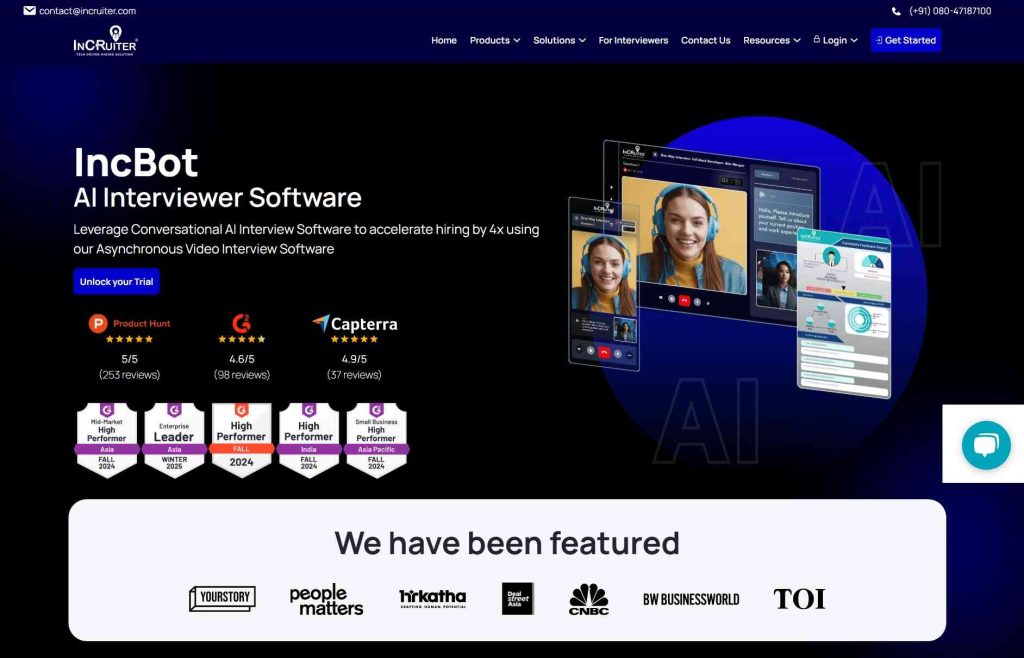
InCruiter’s AI Interview Platform helps companies conduct faster, smarter, and more structured interviews without relying on internal panels. Powered by advanced conversational AI, it evaluates candidate responses in real time, auto-generates questions based on job roles, and delivers instant feedback reports. This platform ensures consistent assessments, reduces hiring bias, and cuts down time to hire by over 80%. Whether for tech or non-tech roles, it supports large-scale hiring with ease and accuracy. Recruiters can focus on decisions while the AI handles screening and evaluation effortlessly.
Key features:
- Conversational AI for Interviews: Automated bot conducts realistic interview rounds, asks follow-up questions, and evaluates responses based on tone, confidence, and clarity.
- AI Resume Screening: Automatically filters resumes by matching job roles with candidate skills, keywords, and experience for faster shortlisting.
- AI-Generated Interview Questions: Creates role-specific, skill-based questions instantly from the job description, saving time and ensuring relevant assessments.
- Send Single or Bulk Invites: Easily send interview invites to one or multiple candidates at once, with scheduling and reminders handled automatically.
- Soft, Aptitude, Tech, Coding Skill Assessment: Assess candidates on multiple dimensions, including behavior, thinking ability, technical concepts, and live coding.
- Interview Transcription & Summary: Generates detailed text records of interviews with quick summaries for easier review and faster decision-making.
- Cheat-Proof AI Proctoring Tools: Detects face swaps, multiple persons, background voices, and screen activity to ensure fair and secure interviews.
- White-Labeled Platform: Custom-branded platform with your company name, logo, and colors to offer a professional and consistent hiring experience.
Interviewer
Interviewer is a smart platform that runs automated interviews using machine learning. It asks role-specific questions, records answers, and gives instant scores. Recruiters can review detailed reports with communication, confidence, and skill analysis. It helps companies speed up screening without needing a human panel, making early-stage hiring simple and structured.
HireVue
HireVue uses machine learning to run video-based interviews, allowing companies to screen candidates faster. AI for job interviews analyzes facial expressions, speech, and responses to rate candidates. Employers get structured feedback and rankings, helping them choose the best fit easily. The AI-based interview platform supports high-volume hiring and is often used by large enterprises.
Veloxhire
Veloxhire offers an AI for job interviews that handles candidate interviews with real-time question generation and skill-based scoring. It supports multiple job roles, from tech to sales. The AI-based interview tool records interviews, evaluates answers, and helps teams shortlist better candidates quickly. It’s useful for scaling hiring while keeping quality checks in place.
LockedIn AI
LockedIn AI for job interviews provides automated interviews designed to check soft skills, communication, and confidence. The platform generates role-based questions, records responses, and offers detailed analysis through AI scoring. AI in Recruitment is ideal for recruiters looking to save time on first-round interviews without losing insight into how candidates perform under pressure.
Conclusion
The rise of AI in interviews marks a major shift in how organizations identify the right talent. It simplifies the process, eliminates guesswork, and ensures consistency at every stage of evaluation. As both candidates and recruiters adapt, the goal remains the same: finding the best fit with clarity and confidence. Embracing AI in interviews is no longer an option but a natural step forward in modern hiring.
Ready to streamline your interviews? Start exploring InCruiter AI-based interview software built for tomorrow’s workforce.
Frequently Asked Questions
1. Do AI interviews include coding tests?
Yes, the best AI interview platforms, such as InCruiter, support coding assessments, especially for technical roles. These tests evaluate logic, code quality, execution speed, and problem-solving skills. The AI also automatically scores code submissions and detects plagiarism, providing a consistent and scalable way to assess developers.
2. Are AI interviews fair for introverts?
AI interviews can be fair for all kinds of candidates, as they eliminate the social pressure of live interview panels. However, using AI for job interviews evaluates tone, clarity, and structure, introverts may need to prepare more intentionally for their writing. AI-based interview platforms are improving to accommodate diverse communication styles without penalizing quiet confidence.
3. Can AI understand different accents?
Yes, an AI interview platform can understand different accents, especially on platforms like Incruiter, which is designed to recognize over 160 English accents globally. While no system is perfect, speaking naturally helps. If you’re unsure, InCruiter’s AI mock interviews let you test your accent’s compatibility and polish your delivery before the real thing. Just be yourself, and the tech adapts.
4. Can AI interviews adapt to different job levels?
Yes, AI for job interviews can be tailored to suit entry-level, mid-level, or senior roles. For example, a Graduate Trainee might be asked basic aptitude and communication questions, while a Software Engineer faces logic-based coding tasks (based on Java, Python, and Data Science). A Project Manager could be assessed on leadership scenarios, and a VP of Sales might receive strategic judgment prompts. The advanced AI for job interviews adjusts tone, complexity, and evaluation depth to match the expectations of each role.
5. Do AI interview tools completely replace human interviewers?
Not entirely. Artificial Intelligence interview is primarily used in the early stages to standardize screening and save time. Final decisions, cultural fit assessments, and leadership evaluations often still involve human judgment. AI in interviews enhances the process but doesn’t fully replace human intuition in critical hiring calls.
Ready to Transform Your Hiring Process?
Discover how our AI-powered interview platform can streamline your recruitment and find the best candidates faster.

